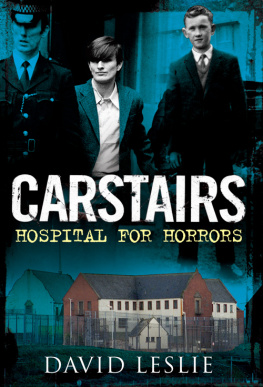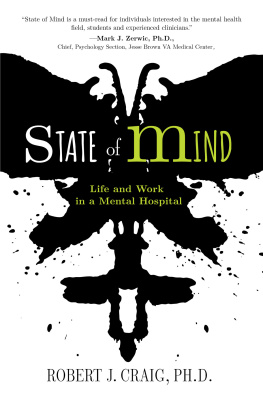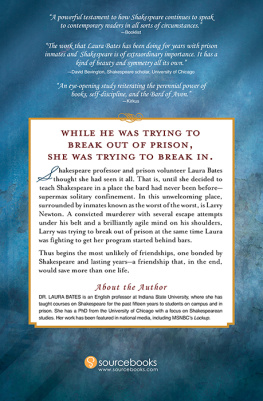The Madman's Tale
John Katzenbach
For Ray, who helped to tell this tale more than he will ever know.
Part One
The Unreliable Narrator
Chapter 1
I can no longer hear my voices, so I am a little lost. My suspicion is they would know far better how to tell this story. At least they would have opinions and suggestions and definite ideas as to what should go first and what should go last and what should go in the middle. They would inform me when to add detail, when to omit extraneous information, what was important and what was trivial. After so much time slipping past, I am not particularly good at remembering these things myself and could certainly use their help. A great many events took place, and it is hard for me to know precisely where to put what. And sometimes I'm unsure that incidents I clearly remember actually did happen. A memory that seems one instant to be as solid as stone, the next seems as vaporous as a mist above the river. That's one of the major problems with being crazy: you're just naturally uncertain about things.
For a long time, I thought it all began with a death and ended with a death, a little like a nice set of bookends, but now I'm less positive. Perhaps what truly put all those moments in motion all those years back when I was young and truly mad was something far smaller or more elusive, like a hidden jealousy or an unseen anger, or much larger and louder, like the positions of the stars in the heavens or the forces of the ocean tides and the inexorable spin of the earth. I do know that some people died, and I was a lucky child not to join them, which was one of the last observations my voices made, before they abruptly disappeared from my side.
Instead, what I get now instead of their whispered words are medications to quiet their noises. Once a day I dutifully take a psychotropic, which is an oval-shaped, eggshell blue pill and which makes my mouth so dry that when I speak I sound like a wheezing old man after too many cigarettes or maybe some parched deserter from the Foreign Legion who has crossed the Sahara and is begging for a drink of water. This is followed immediately by a foul-tasting and bitter mood-elevator to combat the occasional black hearted and suicidal depression I am constantly being told by my social worker that I am likely to tumble into at just about any minute regardless of how I actually do feel. In truth, I think I could walk into her office and click up my heels in pure joy and exaltation over the positive course of my life, and she would still ask me whether I had taken my daily dosage. This heartless little pill makes me both constipated and bloated with excess water, sort of like having a blood pressure cuff wrapped around my midsection instead of my left arm, and then pumped up tight. So I need to take a diuretic and then a laxative to alleviate these symptoms. Of course, the diuretic gives me a screaming migraine headache, like someone especially cruel and nasty is taking a hammer to my forehead, so there are codeine-laced painkillers to deal with that little side effect as I race to the toilet to resolve the other. And every two weeks I get a powerful antipsychotic agent in a shot by going to the local health clinic and dropping my pants for the nurse there who always smiles in precisely the same fashion and asks me in exactly the same tone of voice how I am that day, to which I reply "Just fine" whether I am or not, because it is pretty obvious to me, even through the various fogs of madness, a little bit of cynicism and drugs, that she doesn't really give a damn one way or the other, but still considers it part of her job to take note of my reassurance. The problem is the antipsychotic, which prevents me from all sorts of evil or despicable behavior, or so they like to tell me, also gives me a bit of palsy in my hands, making them shake as if I was some nervously dishonest taxpayer confronting an accountant from the IRS. It also makes the corners of my mouth twitch slightly, so I need to take a muscle relaxant to prevent my face from freezing into a permanent scare-the-neighborhood-kids mask. All these concoctions zip around willy-nilly through my veins, assaulting various innocent and probably completely befuddled organs on their way to calming the irresponsible electrical impulses that crackle about in my brain like so many unruly teenagers. Sometimes I feel like my imagination is similar to a wayward domino that has suddenly lost its balance, first teetering back and forth and then tumbling against all the other forces in my body, triggering a great linked chain reaction of pieces haphazardly falling click click click around inside of me.
It was easier, by far, when I was still a young man and all I had to do was listen to the voices. They weren't even all that bad, most of the time. Usually, they were faint, like fading echoes across a valley, or maybe like whispers you would hear between children sharing secrets in the back of a playroom, although when things grew tense, their volume increased rapidly. And generally, my voices weren't all that demanding. They were more, well, suggestions. Advice. Probing questions. A little nagging, sometimes, like a spinster great-aunt who no one knows precisely what to do with at a holiday dinner, but is nevertheless included in the festivities and occasionally blurts out something rude or nonsensical or politically incorrect, but is mostly ignored.
In a way, the voices were company, especially at the many times I had no friends.
I did have two friends, once, and they were a part of the story. Once I thought they were the biggest part, but I am no longer so sure.
Now, some of the other people I met during what I like to think of as my truly mad years had it far worse than I. Their voices shouted out orders like so many unseen Marine drill sergeants, the sort that wear those dark brown green wide-brimmed hats perched just above their eyebrows, so that their shaved skulls are visible from the rear. Step lively! Do this! Do that!
Or worse: Kill yourself.
Or even worse: Kill someone else.
The voices that shrieked at those folks came from God or Jesus or Mohammad or the neighbor's dog or their long-dead great-uncle or extraterrestrials or maybe a chorus of archangels or perhaps a choir of demons. These voices would be insistent and demanding and utterly without compromise and I got so that I could recognize in the tautness that these people would wear in their eyes, the tension that tightened their muscles, that they were hearing something quite loud and insistent, and it rarely promised any good. At moments like those, I would simply walk away, and wait near the entranceway or on the opposite side of the dayroom, because something altogether unfortunate was likely to happen. It was a little like a detail I remembered from grade school, one of those odd facts that stay with you: In the event of an earthquake, the best place to hide is in a doorway, because the arched structure of the opening is architecturally stronger than a wall, and less likely to collapse on your head. So when I saw the turbulence in one of my fellow patients become volcanic, I would find the arch where I thought the best chance of surviving lay. And once there, I could listen to my own voices, which generally seemed to watch out for me, more often than not warning me when to make tracks and hide. They had a curiously self-preservative streak to them, and if I hadn't been so stupidly obvious in replying out loud to them when I was young and they first joined my side, I probably never would have been diagnosed and shipped off in the first place, as I was. But that is part of the story, although not the greatest part by any means, but still, I miss them in an odd way, for now I am mostly lonely.








